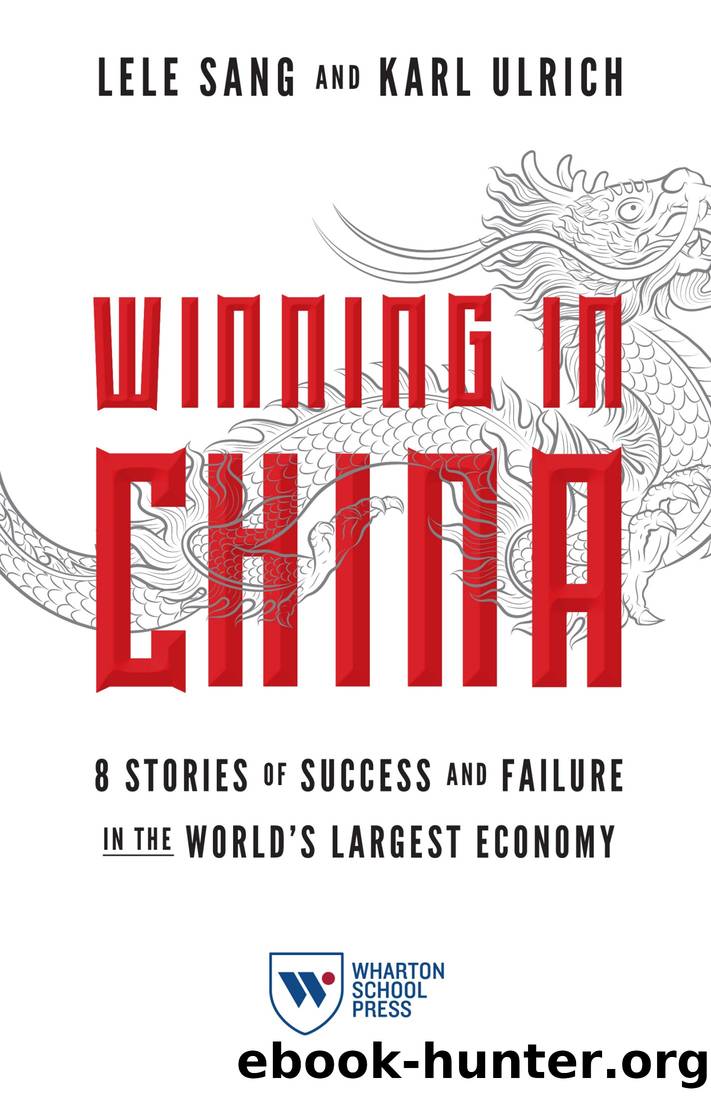Winning in China: 8 Stories of Success and Failure in the World's Largest Economy by Lele Sang & Karl Ulrich

Author:Lele Sang & Karl Ulrich [Sang, Lele & Ulrich, Karl]
Language: eng
Format: epub
ISBN: 9781613631072
Google: cAI2EAAAQBAJ
Published: 2021-01-19T04:51:24+00:00
Sequoia with Chinese Characteristics
Though Sequoia China was rooted in Sequoiaâs US business, it wasnât controlled by its parent in the traditional way, with big decisions made in California and orders emanating from there. Leone insisted Shen and his team make their own decisions. That was a lesson heâd learned in Israel. When Sequoia and Cisco set up an Israeli investment fund in 1999, their approach was to let the Israelis vet potential deals but have the US office make the decisions. That arrangement proved sluggish. In China, Leone wanted decentralization. Shen was expected to create his own distinctive plan.
Shenâs departures from Sequoiaâs US investment strategy started early. Initially, he and his team financed Qihoo360, an internet security company, and Dianping, a restaurant review siteâchoices consistent with the focus of Sequoia US. But then they bet on Noah, a wealth management company with no particular enabling technology, investing about $5 million for roughly a 20% stake. Three years later, in 2010, Noah went public on the New York Stock Exchange and raised $100 million. Today itâs the largest independent wealth management company in China and valued at $2.6 billion. As the only institutional investor, Sequoia China earned a good return. âYou would never have done that without a localized strategy,â Shen said. Though Sequoia US had invested in the financial sector, it focused mainly on financial technologies, so-called fintech. But Shen knew his home market well enough to bet not just on IT and health care but also on a broader spectrum of industries, as China wasâand still isâin many categories âan open space,â he said.
As the market evolved, Sequoia Chinaâs strategy diverged further from its parentâs. Chinese entrepreneurs, after years of learning from Western peers and being called copycats, had started to develop their own products and business models that didnât have a model in the United States. These companies could baffle even sophisticated investors from Silicon Valley, including Leone himself. For the first 10 years he visited China, while Chinese entrepreneurs were playing catch-up, Leone would point to a Chinese company and say: âI know itâI saw this in the US.â Yet over the years, his déjà vu began to fade.
Take Meituan-Dianping as an example of how China is creating new categories of companies. Itâs hard to define what Meituan-Dianping is. Itâs a group-buying and review site. It handles food delivery, hotel bookings, movie ticketing, ride hailing, and other services. In 2018, it acquired Mobike. It rolls the services of Groupon, Yelp, Grubhub, Kayak, and Uber into a single enterprise. When Sequoia China first encountered Meituan-Dianping, it was two separate companies: Groupon-like Meituan and Yelp-like Dianping. (Dianping was founded in 2003, a year before Yelp.)
Sequoia China was the only investor in both companiesâ earliest financing rounds. With the evolution of bothâMeituan added food delivery, Dianping started offering group dealsâa fight for market share erupted. Both firms burned through cash. Sequoia China facilitated a truce and a merger, which created a company with over 300 million Chinese users. During the companyâs fund-raising, one leading investor dropped out after its letter of intent was signed.
Download
This site does not store any files on its server. We only index and link to content provided by other sites. Please contact the content providers to delete copyright contents if any and email us, we'll remove relevant links or contents immediately.
Zero to IPO: Over $1 Trillion of Actionable Advice from the World's Most Successful Entrepreneurs by Frederic Kerrest(4529)
Machine Learning at Scale with H2O by Gregory Keys | David Whiting(4295)
Never by Ken Follett(3937)
Harry Potter and the Goblet Of Fire by J.K. Rowling(3848)
Ogilvy on Advertising by David Ogilvy(3608)
Shadow of Night by Deborah Harkness(3361)
The Man Who Died Twice by Richard Osman(3072)
Book of Life by Deborah Harkness(2932)
The Tipping Point by Malcolm Gladwell(2914)
Will by Will Smith(2911)
0041152001443424520 .pdf by Unknown(2843)
Purple Hibiscus by Chimamanda Ngozi Adichie(2828)
My Brilliant Friend by Elena Ferrante(2824)
How Proust Can Change Your Life by Alain De Botton(2807)
How to Pay Zero Taxes, 2018 by Jeff A. Schnepper(2646)
Hooked: A Dark, Contemporary Romance (Never After Series) by Emily McIntire(2550)
Rationality by Steven Pinker(2352)
Can't Hurt Me: Master Your Mind and Defy the Odds - Clean Edition by David Goggins(2324)
Borders by unknow(2304)
